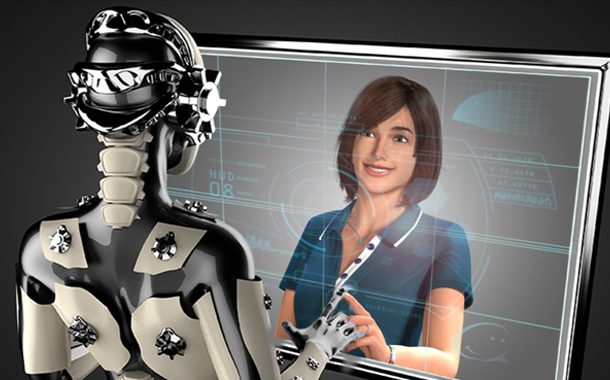An amalgamation of the human mind and expert computing capabilities, Cognitive Computing is being hailed as the path to future advancements. With IT Giants fortifying R&D and evaluating its innumerable applications, the market is just beginning to mature and the opportunities are endless.
Participant Quotes:
 “For end customer facing industries, automated and intelligent personalization is a big business goal to achieve.”
“For end customer facing industries, automated and intelligent personalization is a big business goal to achieve.”
Eron Kar
Practice Head
Analytics
Happiest Minds Technologies
 Many startup companies have qualified themselves as using Cognitive Computing, and it’s the new playground for Venture Capital funds.”
Many startup companies have qualified themselves as using Cognitive Computing, and it’s the new playground for Venture Capital funds.”
Madhav Kulkarni
Vice president
Head of Application
Management (India GDC), Atos
 “Cognitive computing has the potential to augment our reasoning capabilities and empower us to make better informed real-time decisions.”
“Cognitive computing has the potential to augment our reasoning capabilities and empower us to make better informed real-time decisions.”
Saurav Kumar
CEO and Cofounder
Cube26
 “It is imperative that when you digest data, you are able to explore the way that your brain does and that it reacts naturally and is also natural for you to use.”
“It is imperative that when you digest data, you are able to explore the way that your brain does and that it reacts naturally and is also natural for you to use.”
John Sands
Qlik Evangelist and an expert
BI industry
 “Over the next five years, there will be a stronger demand for cognitive computing with data being churned out every single second.”
“Over the next five years, there will be a stronger demand for cognitive computing with data being churned out every single second.”
Andy Stevenson
Head of Middle East & India
Fujitsu
Driving forces behind cognitive computing
- Extensive Storage Capability
- Big Data
- Advanced Analytics
- AI
- Robotics
- VR
- Natural Language Processing (NLP)
- Computational Linguistics
- Machine Vision
Industry Examples
- Autonomous Cars (Tesla Cars and Uber Self Drive Taxis)
- Personal Assistants (Microsoft Cortana, Apple Siri)
- Computing Platforms (IBM Watson, SAP HANA)
- Retail Services (Amazon.com)
Top Cognitive Applications
- IoT
- Visual Recognition,
- Video Analytics
- Advance Text Mining
- Speech Recognition
Story
Computing has changed the face of the planet in a short period of time. In a matter of a few decades, man has been able to make remarkable technological advancements from industrial automation and more efficient processes to new channels of business and more personalized experiences. Now, with further innovation cognitive computing has emerged as the next step in this technological advancement. The concept of cognitive computing is a range among the planet’s leading tech giants who have all been infusing gigantic quantum of money is R&D of their own cognitive capabilities. Technology has forever help strong the promise unto delivering more personalized experiences to its users. The concept of Cognitive computing is, as industry vibrantly puts it, homecoming of this promise.
Understanding Cognitive
Cognition or reasoning has been an asset for the human brain that has been long aspired to be inculcated in machines and computing systems. The concept of cognitive computing basically means a computing environment that mimics the human brain through a collaboration of different technologies like data mining, AI, natural language processing. Saurav Kumar, CEO and Cofounder, Cube26, a cognitive startup puts the concept in easy words, “Cognitive Computing develops core technologies that enable computing systems to learn, reason and apply knowledge gained through experience, and respond intelligently to things that have not been previously encountered.”
Cognitive computing enables machines to make more human-like decisions to different tasks rather than following set protocols having extensive applications yet limited flexibility. With a more learning based approach, cognitive technologies are enabling more autonomous, better interactive systems which need little or no human assistance at all. As Eron Kar, Practice Head – Analytics at Happiest Minds Technologies explains, “Instead of algorithms which had to be programed to take certain rule based decisions in yesteryears, today we can build in some amount of intelligence in them for these algorithms to take intelligent decisions based on data based intelligence.”
Cognitive computing owes its advent to a number of technologies catalyzing it like proliferation of Storage Technologies, Big Data, Advanced Analytics, AI, Robotics, Virtual Reality, Natural Language Processing, Computational Linguistics and Machine Vision. Perhaps the most anticipated technological trends of recent times, cognitive computing promises to a better tomorrow where with a limitless pool of data, computing environments would be able to make decision making more precise and foolproof.
How it’s changing business
Although at a very nascent stage, the businesses are already witnessing the effects of cognitive computing with examples across verticals. From autonomous self-driven cars to personalized customer experiences, cognitive is rapidly changing how systems and products are being developed today. Cognitive computing enables smarter machines which can perform decision based tasks where traditional computing environments simply fail. Andy Stevenson, Head of Middle East and India, Fujitsu opines, “Today irrespective of applications, all kinds of advanced technology have some elements of cognitive computing in it. Cognitive computing has played a key role in the development of the smart technologies. In simple terms, cognitive computing eases out the situation when the traditional system faces a difficulty.”
The rage around cognitive computing and the fact that its full scope is yet to be deciphered are making industries take notice of the technology. Yet the industry has already seen a number of applications for cognitive computing. IBM has its Watson initiative, SAP has its HANA platform, Amazon uses cognitive to offer better customer experience, Microsoft has Cortana and Apple’s got Siri. As Madhav Kulkarni, Vice president and Head of Application Management (India GDC), Atos remarks, “Cognitive computing is being used in numerous artificial intelligence applications, including expert systems, natural language programming, neural networks, robotics and virtual reality. Many startup companies have qualified themselves as using Cognitive Computing, and it’s the new playground for Venture Capital funds that invest billions of dollars in that area. Deep Learning has emerged as a breakthrough technology. Machine learning, speech recognition and emotions in human- machine interactions are the most promising technologies related to artificial intelligence, especially for virtual assistants of tomorrow.”
Sectors and Applications
In itself, cognitive computing is advancement to traditional computing. It brings together a lot of technologies and has already seen applications in driverless cars (Tesla), mobile personal assistant computers (Siri and Cortana), healthcare personalization and improving individual shopping experiences from customer to customer (e-commerce giants like Amazon).
The most proliferate use of cognitive today is in end customer oriented sectors and industries like retail, healthcare and BFSI. This is due to the increased level of personalization cognitive assures. Eron Kar of Happiest Minds believes, “Most of these industries are end customer facing industries and for end customer facing industries, automated and intelligent personalization for their customers is a big business goal to achieve.” On the major application of cognitive, he adds that the number of applications is expected to grow as the industry gradually endorses the concept, “IoT, Visual Recognition, Video Analytics, Advance Text Mining, Speech Recognition are some of the current applications but there are many more to come and the impact on business will be huge both from a revenue and a cost perspective.”
Fujitsu’s Andy Stevenson shares the mood and anticipates cognitive to surprise everyone with its applications over time, “The market for cognitive computing is growing at a steady pace. It is leaving a positive impact on various sectors such as analytics, defense, and research to name a few. It is generating lot of interest in the automotive segment as well, especially for self-drive cars.”
The major verticals where Cognitive Computing is already playing a key role are Healthcare, Financial Services, Retail and Travel. Atos’ Madhav Kulkarni elaborates, “In Healthcare, Cognitive can transform the industry from being reactive to providing proactive approach to wellness. In Financial Services, it addresses a variety of needs from personal advising to detecting potential fraud. CC apps can act as personal shopper providing answers to product related queries and making recommendation based on previous purchases, interests and needs. Additionally, cognitive apps can eliminate the process of searching several sites when trying to plan a trip.”
Apprehensions Attached
A relatively unexplored territory, Cognitive computing is a concept, the implementation of which requires extensive R&D on finding its usage and applications for business. There are mixed responses towards the endorsement of cognitive in industries. As Eron Kar of Happiest Minds puts it, “Some of the business leaders are skeptical and some expect the world out of it. Both are wrong approaches to take. One has to be prudent in their approach towards Cognitive computing and identify through extensive research the right application of Cognitive computing in their context.”
Cube26 CEO Saurav Kumar believes just as with any other technology, cognitive computing will also have to deal with the aspect of security. He says, “Security is among the most important and pressing challenges of all times in cognitive computing. With the growing access to mobile computation and the growth of computing strength on the mobile itself, security plays a major issue with regards to cognitive computing.” Fujitsu’s Andy Stevenson also shares this view, “It may require a high verification effort to align the autonomous practiced behavior patterns with the planned intended behavior patterns of the systems. Of course, unexpected security gaps could arise which could lead to a run-off of confidential information.” On the other hand, Andy also believes that Cognitive will contribute to improvement of security systems worldwide, “Cognitive technologies could deliver new opportunities to combat security concerns while they reveal abnormal behavior of huge system complexes which serve inferences about eventual infections with malware.”
Atos opines that as Cognitive technologies gradually gain momentum, an aspect other than security will come around as a major concern, he explains, “ One of the first challenges could be the very idea that we may be controlled by algorithms that are likely to predict what we are about to do. Privacy was the central challenge in the previous era. In the next wave of Cognitive Computing, the challenge will be safeguarding free will. Organizations and Customers do realize it’s easy to abuse access to data.”
Collaboration the Way Forward
Virtually unchartered for most organizations, Industry experts believe collaboration is the way forward for leveraging cognitive computing. As Atos suggests, “Organizations should develop an approach for their own digitization by establishing partnerships with leading providers, key customers and also by training their people. They should also create a Cognitive computing working group to evaluate the business opportunities and revenue generation models. That approach could minimize the initial investment, provide rapid ROI, and strengthen relations between customers and their suppliers.” Fujitsu’s Andy adds that customers need to have a disciplined plan before looking to adopt cognitive, “Cognitive Computing is a new rapidly growing IT discipline which is still far away from maturity. Partly this causes an issue for basic research. This is why customers should follow business development plans based on Cognitive Computing. They should also look for consulting and partnerships with leading IT companies with distinct interests and abilities in R&D.”
Happiest Minds’ Eron Kar believes organizations need to be cautious and have a visionary approach, “Cognitive computing still has a long way to go before it replaces humans in decision making especially for businesses. So it has to work hand in hand with current business processes and improve them one step at a time rather than a one-time radical change. Businesses need to understand that unlike any other IT implementation which will yield some process benefits at the end of the implementation, any wrong move can derail the process and create an atmosphere of distrust”
Future of Cognitive Computing
Abuzz with this fresh new idea and its scope of opportunities, the industry is welcoming Cognitive Computing hands on. As Cube26’s Saurav Kumar says, “Cognitive computing technology has the potential to augment our reasoning capabilities and empower us to make better informed real-time decisions. Smart machines and cognitive systems will form the foundation for enhancing speed of access to information and personalizing customer experiences. This is where cognitive computing can play a critical role in accelerating big data to drive personalized advice and insights for consumers and business leaders.”
Fujitsu’s Andy Stevenson is in cahoots with the idea, “Over the next five years, there will be a stronger demand for cognitive computing with data being churned out every single second. The adoption of cognitive computing in the coming days will be determined by various factors such as evolving technology, society, skills, and policies. Big data and cognitive computing will go hand in hand leading to several technological innovations and advancements.” Atos believes that cognitive computing is going to have the same effect as automation did some 50 years ago, “Cognitive Computing is going to challenge white collar, professional knowledge work in the 21st century in the same way that factory automation and the assembly line challenged blue collar labour in the 20th century. The evolution history of industrial robots show that the productivity increases and scale of output has primarily changed the nature of work and created new demand of skills but has not created mass unemployment.”
With Big Data at the crux of cognitive, Saurav of Cube26 ponders that this will lead to a whole new most sought after career theme, “Data science is steadily gaining importance and we have witnessed various companies across sectors hire data scientists. Still at a nascent stage, it definitely has the potential to soon be one of the most sought after career options in India.”
Summing up
With limitless possibilities if you think of it, cognitive computing is set to redefine how businesses work and organizations operate. It is going to replace a number of traditional processes and open up new possibilities. Most of all, it is going to harness the power of the extensive amounts of data, which is the new gold, and in turn provide well evaluated personalized actions based on experience.
Deloitte forecasts that the Cognitive Computing market segment will reach $80 billion by 2018 which in itself is a humongous projection, owing to the fact that the technology would still be improving. The impact of cognitive computing may well run into hundreds of billions of dollars. In the coming times, smart machines and processes will define the organizational infrastructures. Data is being churned out each second and analytics have opened our eyes to new possibility. The latest trick out of ICT’s hat that is cognitive computing holds the promise of delivering computers and systems that can think and evaluate like humans do and then make an evaluated response based on past experiences recorded in its memory.
Increasing developments in the field of cognitive computing are being aimed to relieve humans from a number of undesired tasks like supervision of industrial processes and decision making at various processes. The market for cognitive computing is huge, with a number of applications and implementations coming up every day, and as machines become smarter and smarted, the scope is virtually endless.


